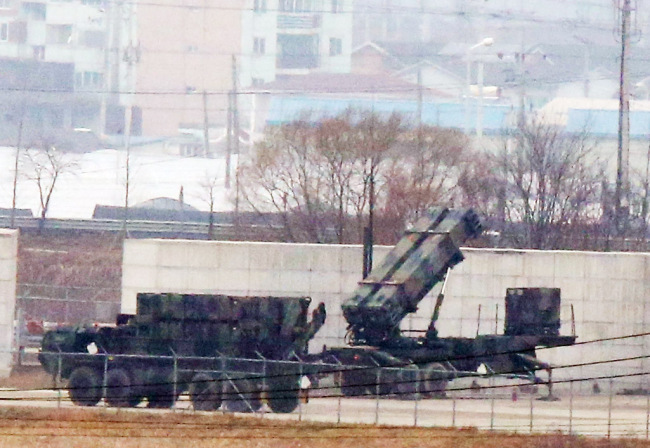Controversy boils over Seoul’s Gaeseong money claim
By Shin Hyon-heePublished : Feb. 14, 2016 - 19:49
Controversy is snowballing after Seoul claimed the majority of its investment in a joint factory park has been funneled into North Korea’s nuclear and missile programs, which critics say virtually marks a confession to its years-long self-contradictory breach of international resolutions.
Announcing a pullout from the Gaeseong industrial park last Wednesday, Unification Minister Hong Yong-pyo singled out Pyongyang’s siphoning of its proceeds as the main rationale behind its decision. Since the compound’s launch in 2004, South Korean cash totaling 616 billion won ($510.1 million) has been transferred chiefly to pay wages to North Korean employees, he noted.
Announcing a pullout from the Gaeseong industrial park last Wednesday, Unification Minister Hong Yong-pyo singled out Pyongyang’s siphoning of its proceeds as the main rationale behind its decision. Since the compound’s launch in 2004, South Korean cash totaling 616 billion won ($510.1 million) has been transferred chiefly to pay wages to North Korean employees, he noted.

The Unification Ministry went further Sunday, saying their salaries and other costs were delivered in U.S. dollars initially to North Korean authorities, which in turn meted out part of the funds to the workers in coupons.
“We’ve confirmed through various channels that about 70 percent of the money has been handed over to the office of the secretary of the ruling Workers’ Party,” the ministry said in a statement.
The ministry’s assertion was made to rationalize its decision to shut down the complex despite vehement opposition from the Gaeseong businesses and growing skepticism from the opposition and progressives over the timing and efficacy of the measure that was considered Seoul’s last resort.
During an appearance on broadcaster KBS earlier in the day, Hong also said the organization, together with the party central committee’s “Office 39,” is in charge of managing foreign currency to be spent on military and other prohibited purposes.
“When North Korea’s party, government and military gets foreign currency, they would send it to the party secretary’s office, or Office 39, which will then be used for nuclear and missile development and luxury goods purchases,” he said.
While diversion concerns have persisted for a while, the ministry’s unveiling fueled fiery debate as it has now conceded to having knowingly infringed upon U.N. Security Council sanctions by publicly raising the connection between the Gaeseong earnings and Pyongyang’s armament initiative.
Resolution 2094, imposed after the communist state’s third atomic experiment in February 2013, bans bulk cash transfers and requires states not to provide public financial support for trade “if there is a link to North Korea’s illicit programs.”
Hong’s remarks also represented an about-face in the ministry’s longstanding position that employee wages could not constitute a violation of the “bulk cash” article. A ministry official reaffirmed the stance to reporters even after Pyongyang’s fourth nuclear test early last month.
The assertion, coupled with its decision on the district’s closure, would undermine the legitimacy of the Park Geun-hye administration’s own policy that the factory park bears “the special nature of inter-Korean relations” and thus should operate “regardless of the political situation,” experts say.
In addition, as explained by its text and the U.S., the “bulk cash” clause was primarily designed to warn North Korean officials from working as “cash couriers,” such as using diplomatic pouches and their own briefcases.
Critics also alleged a jump in logic and demanded the sources of the information, though Hong said during a news conference last Friday the government has “various related materials, but could not tell everything,” citing intelligence matters.
“The ministry’s argument lacks understanding of the North Korean finance structure. U.S. citizens are allowed to travel there and pay for food, lodging and other services in dollars, many of which are provided by the party and military, and the money will return to the facilities in kind or North Korean currency,” Kim Yeon-chul, a unification studies professor at Inje University, wrote on Facebook on Sunday.
“According to the ministry’s rationale, the U.S. government, too, may maintain that some of the dollars were diverted to the party secretary’s office. But instead it has never barred its citizens from visiting North Korea. In international law, the concept of diversion doesn’t apply the way the ministry thinks.”
Chong Seong-chang, head of unification strategy research at the Sejong Institute, said the party offices oversee incomes from numerous sources and the Gaeseong funds, if any, could only account for a fraction.
“Given North Korea’s total trade volume is about 70 times the revenues from Gaeseong, it will be a tremendous mistake to think that shutting down the complex would crush its nuclear ambitions,” he said.
“Rather than make the regime pay a ‘severe price,’ it will most probably deal a major blow to the 55,000 North Korean workers in Gaeseong, the 124 South Korean businesses, their 5,000 partner firms and all the 124,000 employees here.”
By Shin Hyon-hee (heeshin@heraldcorp.com)











![[Hello India] Hyundai Motor vows to boost 'clean mobility' in India](http://res.heraldm.com/phpwas/restmb_idxmake.php?idx=644&simg=/content/image/2024/04/25/20240425050672_0.jpg&u=)







